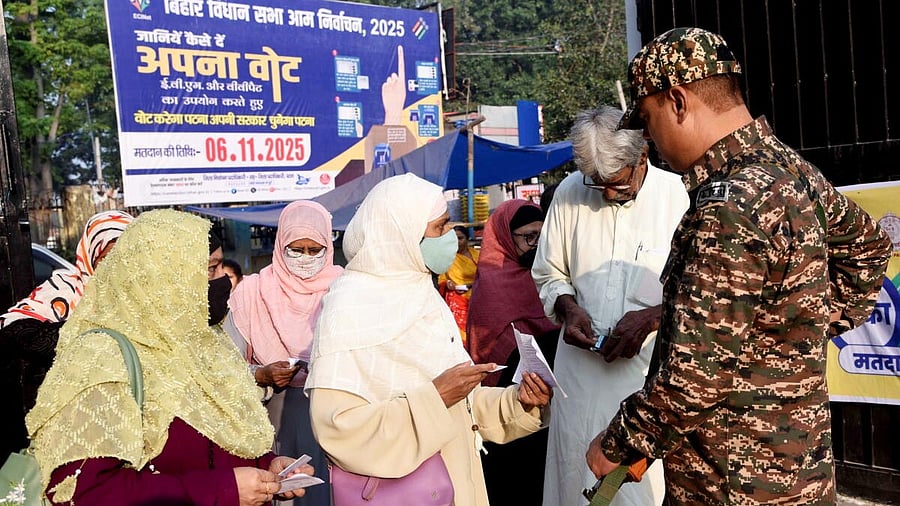
People arrive to cast votes at a polling station during the first phase of Bihar Assembly elections, in Patna.
Credit: PTI Photo
Amaravati: For hundreds of migrant workers from Bihar living in Andhra Pradesh, the thought of returning home for the upcoming assembly elections is overshadowed by their daily struggle to survive in the southern state.
The first phase of polling to the 243-members Bihar Assembly was proceeding on Thursday while the next phase is scheduled for November 11.
The migrant labourers work long hours in hotels, poultry stalls, construction sites, and other tough jobs, often earning a little more than what they could make back home, yet their hearts remain tied to the villages they left behind.
Hareram Yadav, residing in Guntur and originally from Patna, said Bihar has changed drastically.
"In 1990, youth migrated for jobs, but now opportunities have grown," he mentioned.
He said that Nalanda University is being developed with funds sanctioned by Prime Minister Narendra Modi.
Educational institutions have increased, and villages receive free power up to 200 units, Yadav noted proudly.
Yadav further said every household now receives clean water under "Har Ghar Jal" scheme as the government ensures the supply of Bhagirathi river water across Bihar, showing visible transformation.
He insisted that Nitish Kumar's government should continue.
"Only a stable government can ensure consistent growth. Frequent changes halt progress and delay welfare schemes," the Guntur-based migrant explained confidently.
Yadav said the Bihar election holds national significance. If Kumar loses, the INDIA bloc may gain strength and try to lure Andhra Pradesh Chief Minister N Chandrababu Naidu into its fold for a bigger and active role in national politics, he claimed.
He added that the opposition might even offer Naidu a prominent national role to join their alliance and if that happens, the Modi government could collapse, which is "not good for the state as well as the country".
Vinod Gupta from Patna, who settled in Vijayawada, said Bihar's transport and security improved greatly. Earlier, travel was unsafe, but now women move freely at night, he recalled.
Gupta observed significant progress in roads, railways, and airports and noted that law and order has improved as the crime rate has fallen.
Likewise, he said infrastructure expanded and Bihar is developing steadily under Kumar's administration,
Mohammed Nausaad (35) from Rakhpura village in Madhubani district, who has been living in Vijayawada for the past three years, migrated to the southern state after being forced to shut down his general store during the Covid-19 pandemic.
He backs the young RJD leader Tejasvi Yadav in the forthcoming elections.
"I had a small general store and also tended to sheep in Bihar before the Covid-19 pandemic, but the lockdown ruined my business," Nausaad told PTI.
Nausaad is part of about 100 internally migrated people eking out a living in hotels in Vijayawada.
He now works at a chicken centre to earn Rs 700 a day for 15 hours work.
Back home, he would get Rs 400 for the same work, which isn’t enough for his survival.
He said if Yadav wins, maybe a few people will get jobs back home.
For most of them, life in Andhra Pradesh is a trade-off between distance and dignity—better wages but long, exhausting days.
Mohammad Irshad (30), who has been working in Vijayawada for six years, said unemployment and corruption drove him out of Bihar.
"We voted for Nitish Kumar, but he never cared for the poor. Even graduates are jobless and end up doing the same work as us here," he claimed.
Irshad said he earns between Rs 500 and Rs 600 a day but spends nearly half of it on rent and food.
He said even if he gets Rs 600 per day in Bihar, he would stay back and highlighted that getting a government job requires paying a bribe which he can’t afford.
A Central Government employee, maintaining anonymity, said that he is from Lakhisarai district in Bihar and works in Vijayawada now.
He claimed that Kumar’s rule ended the "jungle raj" and improved roads and safety, but the problem of unemployment remains deep-rooted.
"Earlier, murders were common, and people were afraid to step out at night. Now, law and order is better, but industries have died. The sugar factories from British times are gone, and no new industries have replaced them," he said.
He also noted that corruption continues to plague the system, from the "police to top officials, everyone expects a bribe".
For any reason in Bihar, one has to pay half the loan obtained as a bribe, the Central Government employee claimed.
Despite their hardships, many migrants say they still hold on to the hope that Bihar will change.
"We all want development, not freebies. But people still fall for promises every election," he added.
For now, the lives of the hard-working migrants continue between dawn and midnight shifts, far from home, with their votes left behind in the northern state's villages.
Over the past decade and a half, the southern state is witnessing rampant internal migration with labourers trooping in from states such as Bihar, Uttar Pradesh, West Bengal, Assam and others.
Many of these workers are eking out a living as stewards in hotels, painters, labourers and also as workers in aquaculture units, among others.